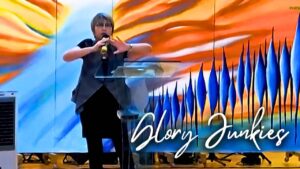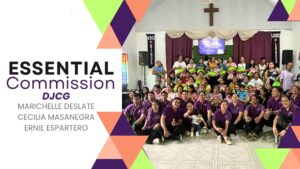Title: The Faithful Followers
Scripture Reading: Psalm 32:1; Rev 17:12-14
Psalm 32:1: ‘How blessed is he whose transgression is forgiven, whose sin is covered!’
Revelation 17:12-14: ‘The ten horns which you saw are ten kings who have received no kingdom as yet, but they receive authority for one hour as kings with the beast. These are of one mind, and they will give their power and authority to the beast. These will make war with the Lamb, and the Lamb will overcome them, for He is Lord of lords and King of kings: and those who are with Him are called, chosen, and faithful.’
Psalms 35:28 tells us the tongue of the faithless spreads lies, rumors, and bitterness but the tongue of the faithful follower tells of the righteous of YHWH and His praise.’
Jesus puts faithfulness alongside justice and mercy.
In Matthew 23:23 Jesus says, ‘Woe unto you, scribes and Pharisees, hypocrites! For ye pay tithe of mint and anise and Cummins and have omitted the weightier matters of the laws (what is the weightier matters of the Laws?), judgment, mercy and faith: these ought ye to have done, and not to leave the other undone
Mother Teresa said, ‘God has not called me to success but to faithfulness.’
Revelation 17:12-14 says, ‘The ten horns which you saw are ten kings who have received no kingdom as yet, but they receive authority for one hour as kings with the beast. These are of one mind, and they will give their power and authority to the beast. These will make war with the Lamb, and the Lamb will overcome them, for He is Lord of lords and King of kings: and those who are with Him are called, chosen, and faithful.’
Let’s apply this truth to our lives:
- We answer to that description.
- Are we this? It does not at all follow that we are chosen because we are called. All the chosen are called, but not all the called are chosen.
- If we be of those who are faithful. Called we are; chosen we may be. If faithful, then we are of the chosen too; and this, and this only, is the proof.
Psalm 32:1 says, ‘How blessed is he whose transgression is forgiven, whose sin is covered!’ The term ‘blessed’ is used 26 out of 45 times in Psalms, and is a recurrent theme in the Wisdom Literature and describes the faithful followers.
Whose then are the faithful followers?
- They are disciplined by Shaddai.
Job 5:17 says, ‘Behold, how happy is the man whom God reproves, so do not despise the discipline of the Almighty.
Job 5 asserts the central theological position of the ‘two ways’, which is ‘in this life the righteous will be blessed and the wicked punished.’
Hebrew 5:8 asserts Jesus was perfected by the things He suffered.’
Notice the contrast:
- Happy is the man whom God reproves
- Do not despise the discipline of the Almighty
‘Almighty’ is the noun Shaddai. – ‘self-sufficient.’
It comes from the Hebrew root ‘Shdd’ meaning ‘destroy, ruin, despoil.
It also comes from the Hebrew root ‘shd’, meaning a woman’s breast: that is, God is the nurturing One or ‘God the protector and Provider. Wow!
There are two points made about this verse.
- The faithful followers did/do/will suffer in this fallen world and at times of their own faults
- God is with them in and through these afflictions. Sometimes He chooses tomiraculously deliver but often He does not. His presence is our greatest need and promise. He knows what we are going through.
- Studies and Walks in God’s word
Psalm 1:2 says, ‘But his delight is in the Law of the LORD, and in His law doth he meditate day and night.’
Isaiah 28:9-10 is so clear: ‘Whom shall He teach knowledge? And whom shall he make to understand doctrine? Them that are weaned from the milk, and drawn from the breasts. For precept must be upon precept, precept upon precept, line upon line, line upon line; here a little and there a little.’
Deuteronomy 18:3-4 says, ‘After the doing of the land of Egypt, wherein ye dwelt, shall ye not do: and after the doings of the land of Canaan, whither I bring you, shall ye not do: neither shall ye walk in their ordinances (law). Ye shall do my judgements, and keep mine ordinances, to walk therein: I am the LORD your God.’
- Takes Refuge in YHWH
Psalms 2:1, 12 says, ‘Why do the heathen rage, and the people imagine a vain thing?
YHWH is warning the rulers of this world to prepare to meet Him. They are to:
- Show discernment
- Take warning
- Worship the LORD
- Rejoice with trembling
- Do homage to His Son
Psalm 2:12 ends with a word for the faithful followers: ‘Blessed are all they that put their trust in Him.’ Another translation says, ‘How blessed are all who take refuge in Him.
We can trust/take refuge in
- A rock
- A fortress
- A stronghold
- A deliverer
- A shield
- A horn of salvation
- A mother hen
Those who defy God are broken, but those who depend on Him are blessed. The psalmist leaves the choice with everyone: broken or blessed?
- Sin is Forgiven
Psalm 32:1-2 says, ‘Blessed is he whose transgression is forgiven, whose sin is covered. Blessed is the man unto whom the LORD imputeth not iniquity, and in whose spirit, there is no guile.’
Catherine the Great of Russia said, ‘I shall be an autocrat: that’s my trade. The good Lord will forgive me: that’s his.’
PT Forsyth pointed out, first, you have to know the ‘despair of guilt’. Then you can appreciate ‘the breathless wonder of forgiveness.
Three pictures of what God does with your sins.
First, the ‘Lord does not count’ your sins against you.
Second, they are covered.
Third, they are ‘forgiven’.
Notice David did not deny his sin. Actually different words were used to describe His rebellion against YHWH.
a. Transgression – it denotes intentional breaking of that which is God’s will
b. Sin – it denotes missing a set target, again not by ignorance but willfully
c. Iniquity – misdeed, guilt appear together here
d. Deceit – means treachery, trickery, fraud
- Consider the Poor
Psalm 41:1-3 says, ‘Blessed is he that considereth the poor: the LORD will deliver him in time of trouble. The LORD preserve him, and keep him alive; and he shall be blessed upon the earth: and thou wilt not deliver him unto the will of his enemies. The LORD will strength him upon the bed of languishing: thou will make all his bed in his sickness.’
The type of person described by the term ‘poor’ are:
- Widow
- Orphan
- Alien
- Blind/lame
- Socially Powerless (landless/homeless)
- Bereft of worldly provisions (no necessary things for life – food, shelter, work, etc.)
Notice what YHWH will do for an obedient faithful follower (helping the poor is just one items but it stands her for the obedient for the Law of God)
- YHWH will deliver him in a day of trouble
- YHWH will protect him
- YHWH will keep him alive
- Know joy and walk in the light of YHWH’s countenance
- Find wisdom
- Fears YHWH





